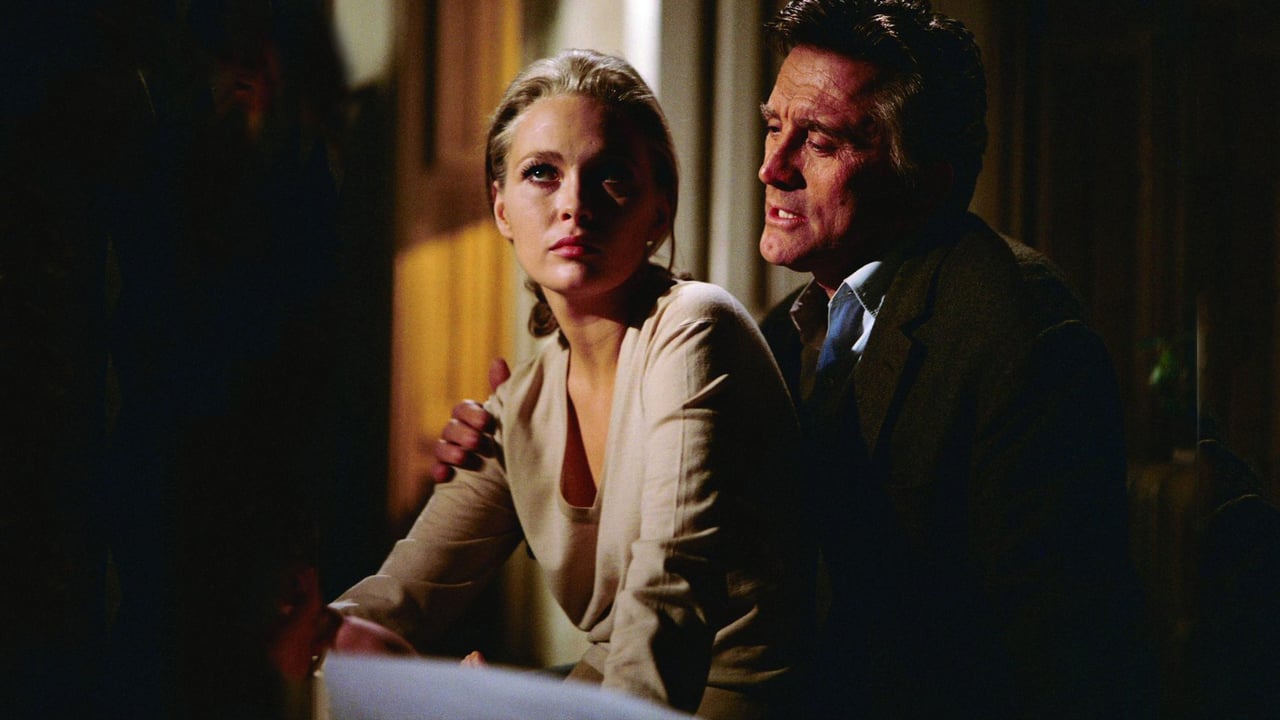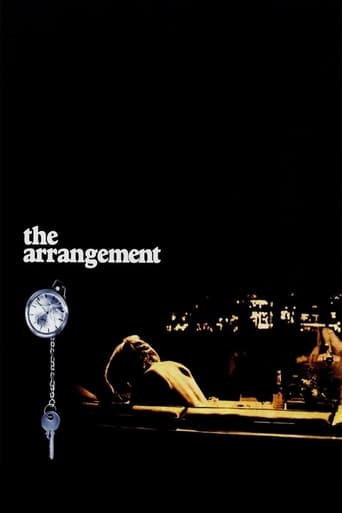ThiefHott
Too much of everything
UnowPriceless
hyped garbage
Invaderbank
The film creates a perfect balance between action and depth of basic needs, in the midst of an infertile atmosphere.
Melanie Bouvet
The movie's not perfect, but it sticks the landing of its message. It was engaging - thrilling at times - and I personally thought it was a great time.
mrb1980
I guess "The Arrangement" has some merit-after all, it showcases late 1960s southern California quite well-but overall the movie is an all-star disaster due to its confusing structure and its incredibly muddled story.Los Angeles advertising executive Eddie Anderson (Kirk Douglas) has a nervous breakdown and tries to commit suicide by driving his sports car under a semi. The rest of the film flashes back to Anderson's childhood, his relationship with his dying father (Richard Boone, who was actually YOUNGER than Douglas), his deteriorating marriage with his wife (Deborah Kerr), and his torrid affair with a co-worker (Faye Dunaway). Along the way the flashbacks were very difficult to track and even harder to understand. Boone's character doesn't do much besides lie in bed, and Deborah Kerr chews the scenery as the cheated wife.I lost track of how many times the story flashed back, and I never did understand what the point of the movie was. The late 1960s time period touches were great, but otherwise I didn't really gain any understanding of the characters. Hume Cronyn, as Anderson's attorney, had about the only decent role in the whole film. If you decide to watch this mess of a film, be prepared for a lesson in confusion and expect to feel pretty empty afterward.
Martin Bradley
Elia Kazan made "The Arrangement" in 1969 after having first published it as a novel. It's a difficult film but ultimately a rewarding one. It begins along the lines of a rather heavy-handed satire on consumerism before turning into a very late sixties psychodrama about a mid-life crisis which Kazan chooses to film in the fractured style of a European art-movie. The central character is Eddie Anderson, (not his real name; he changed it from the original Greek), and from flashbacks we are lead to believe he's the son of the boy from "America, America" who has now become Richard Boone. The film opens with Eddie's bizarre suicide attempt when he drives his sports car under the wheels of a truck and as it moves forward, to some kind of redemption. It also keeps skipping back to the events in Eddie's past that have lead up to that moment when he felt his life was no longer worth living. Kirk Douglas plays Eddie superbly, in what is really a very difficult role. His long-suffering wife is an equally superb Deborah Kerr, mixing acidity and sweetness to an almost alarming degree as she tries to comprehend what it is that's driving her husband. In the role of Eddie's mistress Faye Dunaway is less successful simply because her character is too much of a contradiction; she seems to undergo a complete change of personality. However, there's fine work from Hume Cronyn as Eddie's slimy lawyer and Boone is splendid as the gruff, seemingly uncaring father. The movie itself wasn't a success and critics were heavily divided, many feeling that Kazan had stepped outside of his comfort zone and had largely failed. However, the magazine 'Films and Filming', a bible of British film criticism at the time, selected it as the year's best film from any source. It was hardly that but it is still Kazan's last really good movie, an utterly essential part of one of the great canons of work in world cinema and it certainly shouldn't be missed if you get the chance to see it.
elucidations
How do you sugar-coat Cancer? Eddie Anderson (Kirk Douglas) does it by claiming the 'Zephyr' brand of cigarette (made by his ad company's million-dollar client) is CLEAN. Eddie has gotten rich by selling cigarettes, by selling Cancer (a word he goes out of his way to avoid saying), by saying cigarettes are CLEAN.That's why Eddie is unhappy, alienated, suicidal, and DIRTY.Elia Kazan (and yes, I too have conflicted feelings about the man) makes a film that shows an ad genius who gets rich and powerful, but he's guilt-stricken, and he takes himself down, even tries to take himself out.They still had cigarette advertising on radio and television back in 1969 (when this film was made), and you hear similar ads occasionally in this movie, extolling the pleasures and wonders of 'Zephyr' cigarettes, with copy written by Eddie Anderson himself... you heard those ads repeatedly, on Eddie's car radio, just before he drove his convertible sports car under the wheels of a tractor-trailer.It is a screed against advertising and selling cigarettes, wrapped in the mid-life crisis of a man who does just that, and it causes Eddie to walk away from his fabulously high-paying gig as an ad genius, in the process laughing right in the mortified faces of the cigarette company executives, telling them essentially "I can't do it anymore, I can't sell Cancer anymore."I give it nine stars, reluctantly taking one star away, due to what seemed a too fast narrative between the scene where Eddie has a serious and honest conversation in a hotel room with his wife (Deborah Kerr), which suddenly gets violent, and in the next scene he's appearing before an inquest of some kind, with his arm in a sling, and I wondered if he was hurt in the struggle with his wife, only to learn he was shot, TWICE, at the apartment of Gwen (Faye Dunaway), by the somewhat creepy Charles standing scarily in the shadows, followed shortly by a scene showing Eddie burning down his house.The speed of the narrative at that point almost gave me whiplash. I also thought it caught a little bit of the hip (hippie) look of the late sixties, primarily in Gwen's poster-decorated apartment.
nomoons11
The acting and directing in this was just fine. Typical Kazan effort but the main issue with this is...the story. It's just to jumbled up and leaves too much undone at the end.The simplest synopsis I could give of this film is a guy decides to try and kill himself by driving under a semi truck...he fails. After this we go through his past life and figure out why he's had enough of his life. We find out a year before a pretty serious affair ended and this was part of the reason for the failed suicide. The other is a few things. He seems to have turned out just like his father...whom deep down...he despises. Also, he's just had enough of the life he leads. He wants a change or to just getaway from it all. I guess a mid life crisis.Throughout all this you'll get to meet his father, who is dying, and we learn that he was miserable to his wife and kids and everyone is still afraid of him. We get to see a little of his father in himself and what his family life is like. He tries desperately to get back with the girl who had a previous affair with. He loves her but I think he gets more out of her telling him like it is whereas his wife just lets things be and keeps silent...like his mother did with his father. He appreciates her for this. The girlfriend in this is not exactly a saint in this one to say the least.By the end you'll have a mixed bag of feelings on this one. The end leaves too many things left undone. All in all a good effort but needed more filler for the story. Kazan's book on this one may have been a hit but I don't think it translated well to the screen. I know that films don't all have to have answers or to have happy endings but this needed a closure to the circumstances of the many people involved. All we get is a funeral scene and a lot of assumptions. Maybe that was the intention. Maybe a mid life crisis and all involved is supposed to be....incomplete.

